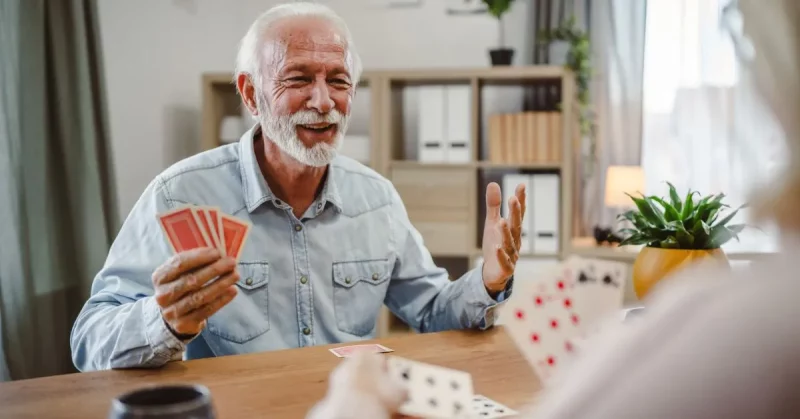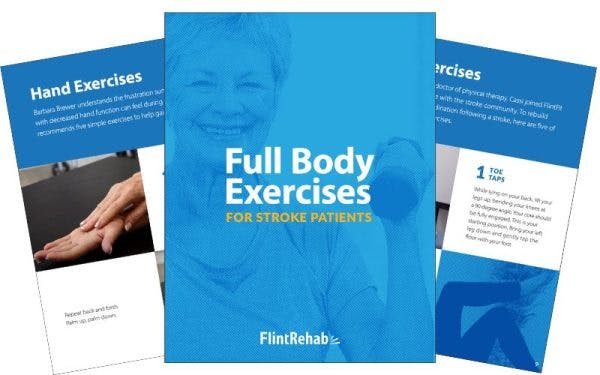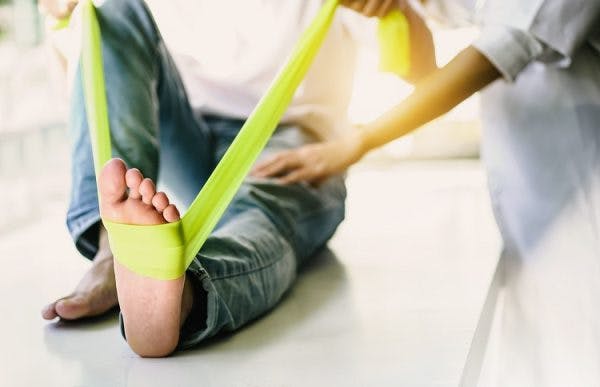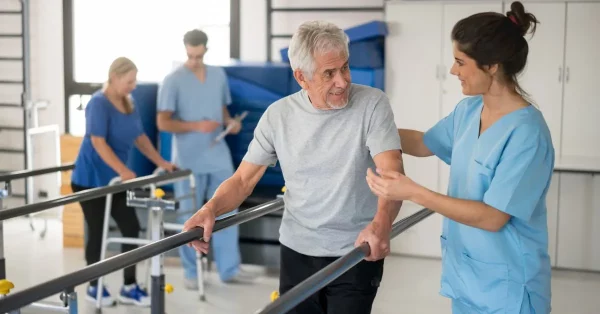Memory problems are common after a stroke. Some survivors may struggle to recall names, dates, appointments, or where they placed everyday items. As a result, these challenges can often affect independence, confidence, and overall recovery. The good news is that memory can improve through targeted cognitive training. A fun and engaging way to do this is through games!
In this article, we will take a look at the best types of games to help improve memory after stroke. These games are great options for survivors, caregivers, and loved ones to use to support cognitive recovery!
Understanding Post-Stroke Memory Loss
Memory issues after a stroke are often linked to damage in specific areas of the brain, particularly those responsible for short-term memory, working memory, or long-term recall.
Types of memory problems can include:
- Difficulty forming new memories
- Trouble recalling past events
- Forgetting daily tasks or conversations
- Losing track of time or location
The severity and type of memory loss depend on the location and extent of the stroke. While these symptoms can be frustrating, the brain has the ability to rewire itself, forming adaptive connections through a process known as neuroplasticity.
Mental exercises, like memory games, can help stimulate this recovery process.
Benefits of Playing Memory Games After Stroke
Incorporating memory games into rehabilitation has several benefits:
- Promotes mental engagement
- Strengthens attention and concentration
- Encourages repetition and recall
- Boosts confidence in cognitive ability
- Can be adapted for all skill levels
Games can also provide a sense of enjoyment and structure, especially during long recovery periods. This can boost motivation to practice memory tasks on a regular basis..
18 Fun and Engaging Games to Improve Memory After Stroke
Let’s explore different categories of games that can support memory improvement. These range from traditional paper-and-pencil or hands-on activities to interactive group challenges.
Classic Puzzle Games
Puzzle games are excellent tools for rebuilding cognitive pathways because they encourage pattern recognition, strategic thinking, and both short- and long-term memory use.
1. Crossword Puzzles
Crosswords test your ability to recall words, definitions, and cultural references. Solving clues requires you to search your memory for synonyms, names, and phrases. For stroke survivors, this can be a fun way to rebuild verbal fluency and memory retrieval in a low-pressure format. You can start with simpler puzzles or ones themed around familiar topics like food, holidays, or favorite hobbies.
2. Word Search
This game supports visual memory and scanning ability. You look for specific words hidden in a grid of letters—an exercise that reinforces spelling patterns, attention to detail, and word recognition. For beginners, using larger print or fewer letters can reduce frustration while still offering cognitive benefits.
3. Sudoku
Though it may seem like a math game, Sudoku actually trains sequential reasoning and working memory. Players must remember which numbers have been used in specific rows, columns, and squares while keeping track of patterns. This trains working memory and decision-making, both commonly affected by stroke. Sudoku puzzles are usually rated by difficulty, so start with a level that is challenging yet doable before advancing.
4. Jigsaw Puzzles
Piecing together a jigsaw requires you to hold mental images of where pieces go, recognize patterns, and recall visual details like color gradients or specific object parts. It also helps rebuild spatial reasoning—often impaired after stroke or brain injury—and can be deeply calming and meditative.
Tip: If visual processing or hand coordination is a challenge, try using puzzles with fewer or larger pieces to start.
Card Games for Cognitive Recall
Card games offer a rich combination of visual memory, attention, planning, and sequencing—essential for cognitive recovery.
5. Memory Match
This classic matching game asks you to flip cards over and remember their locations to find pairs. It challenges visual and spatial memory, concentration, and sustained attention, helping the brain rebuild these skills in a tangible way. It’s especially helpful because it allows for error and correction—important in neurorehabilitation. This game can be easily adapted by modifying the number of cards used.
6. Uno
Beyond the bright colors and fun pace, Uno builds situational memory. You must remember what colors or actions have been played and anticipate what could happen next. It exercises focus, decision-making, and working memory—especially with rules like “Reverse” and “Skip.”
7. Go Fish
Ideal for beginners or those working on conversational memory, Go Fish requires you to recall which cards you and your opponent have asked for. This taps into short-term verbal memory and improves communication in a low-stress environment.
8. Solitaire
Solitaire builds executive function skills like planning, problem-solving, and tracking card sequences. It helps players strategize several steps ahead while recalling which cards are in play. Since it’s a solo game, it’s great for self-paced cognitive workouts.
Tip: Digital versions with larger visuals or prompts can help if fine motor skills are limited.
Board Games That Support Memory
Board games promote cognitive agility, verbal recall, and interpersonal interaction—key elements of holistic recovery.
9. Simon
Simon is a fast-paced memory game that presents sequences of lights and tones that players must repeat. As the sequences grow longer, the game demands more from working memory, auditory and visual processing, and motor coordination. It’s simple to play and highly engaging.
10. Scrabble
Forming words from letter tiles encourages players to retrieve vocabulary, practice spelling, and recognize patterns. It’s especially valuable for those recovering from aphasia or other language impairments. You can adjust difficulty by removing time pressure or limiting play options to shorter words.
11. Sequence
This game blends cards and board placement, challenging players to remember card locations, build strategies, and react to others’ moves. It’s a unique way to combine memory with logic and visual processing.
12. Boggle
Boggle involves shaking up a grid of letters and trying to spot as many words as possible before time runs out. This game supports visual scanning, spelling, word retrieval, and pattern recognition. It can be a great warm-up before language or speech therapy.
Tip: Choose games with minimal setup and clear visuals to reduce fatigue and frustration, playing in an environment with minimal distractions for improved focus.
Interactive Group Games
Group games help rebuild memory while offering emotional support and connection. They’re ideal for therapy sessions, family visits, or community centers.
13. Name That Tune
Playing short segments of music from different eras taps into emotional memory—one of the strongest forms of long-term memory. Even if verbal recall is limited, music often triggers vivid recognition. This game can also boost mood and social interaction.
14. 20 Questions
This deductive game requires players to remember what’s already been asked, think critically, and build logical connections. It encourages sustained focus and strategic questioning—skills often affected after stroke.
15. Story Building
Each person adds a sentence to a group story. This game works on sequencing, memory of earlier story parts, and creative thinking. It can spark laughter, imagination, and deeper interpersonal connection—all while exercising cognitive pathways.
Tip: For those with expressive language difficulties, participants can use gestures or write their sentence instead of saying it aloud.
Physical Games That Challenge the Brain
Combining movement with memory challenges engages multiple brain regions, reinforcing both motor and cognitive function.
16. Scavenger Hunt
This activity blends memory with navigation. Players remember clues, track what they’ve found, and plan where to go next. It’s especially effective for working memory, object recall, and physical coordination. You can make it simple by using just a few objects and clear visual hints.
17. Ball Toss with Questions
While tossing a ball in a circle, ask memory-related questions like “What’s your favorite vacation?” or “Name 3 things you did yesterday.” This encourages retrieval of personal memories while adding movement, which boosts blood flow and brain activity.
18. Dance Memory
In this game, one person performs a few dance moves, and the next repeats and adds one more. It’s like a musical version of “Simon,” promoting motor planning, rhythm, memory sequencing, and fun physical engagement. It can be especially motivating in group settings.
Tip: Use music and visual cues to reinforce each move and keep energy high.
Tips for Choosing the Right Memory Games
Not all games are equally effective for every stroke survivor. Consider these tips when selecting activities:
Start Simple: Choose games that match your current ability level. Starting with an adapted version can prevent frustration and build confidence.
Focus on Repetition: Consistent practice is key. Games that repeat similar tasks in varied ways are especially helpful for memory improvement.
Track Progress: Use tools like journals or simple scorekeeping to see how much you’re improving. Even small wins are motivating.
Incorporate Variety: Mix different types of games to keep things interesting and challenge multiple aspects of memory.
Make It Enjoyable: If a game feels like a chore, it may be hard to stick with. Choose games you enjoy to stay motivated over time.
Final Thoughts
Memory recovery after stroke is a gradual process, but games can be a practical and uplifting part of the journey. Whether you prefer puzzles, board games, card challenges, or group activities, there are countless ways to keep your brain active.
By making memory training a regular part of your routine, you give your brain the best chance to heal and adapt. And perhaps just as importantly, games can bring a little joy and connection to the recovery process—one turn at a time.
Learn more games for stroke patients to promote cognitive ability.









